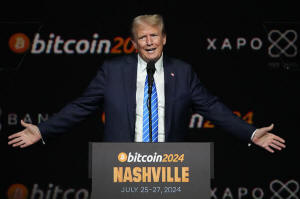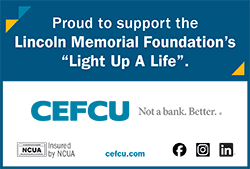The Trump company is not banning private foreign deals, a break with its
first term policy
 Send a link to a friend
Send a link to a friend
 [January 11, 2025] By
BERNARD CONDON [January 11, 2025] By
BERNARD CONDON
NEW YORK (AP) — The Trump family business released a voluntary ethics
agreement Friday that allows it to strike deals with private foreign
companies, a move that could help outside actors try to buy influence
with the new administration.
The so-called ethics white paper bars the Trump Organization from
striking deals directly with foreign governments, but allows ones with
private companies abroad, a significant departure from President-elect
Donald Trump's first term. An ethics pact that Trump signed eight years
ago barred both foreign government and foreign company deals.
The Trump company also announced it would commit to several safeguards
from his first term designed to stop his private financial interests
from shaping policy. That includes hiring an outside ethics adviser to
vet deals.
"The Trump Organization is dedicated to not just meeting but vastly
exceeding its legal and ethical obligations during my father’s
Presidency,” said executive vice president Eric Trump.
The Trump Organization recently struck deals for hotels and golf resorts
in Vietnam, Saudi Arabia and the United Arab Emirates, raising concerns
by government ethics experts that president-elect Trump's personal
financial interests could influence policy toward those countries.
The family company has expressed interest in striking deals in Israel
and elsewhere, and has financial interests in two businesses with
publicly traded stock that could get a boost from foreign investors.
That includes Trump Media & Technology Group, the parent company of
social media platform Truth Social, and a new cryptocurrency venture,
World Liberty Financial.

“The scale of corruption will be orders of magnitude greater than what
we saw in the first Trump administration," said government ethics lawyer
Kathleen Clark of Washington University School of Law in St. Louis.
People trying to win Trump's favor now have an easy way to do so, she
said, by using “massive influxes of cash through ‘investments’ in Trump
crypto and real estate ventures.”
The Trump Organization announced that it was hiring William A. Burck, a
managing partner of Quinn Emanuel LLP, to vet deals that could pose
conflicts with public policy.
As in the last ethics agreement, the five-page white paper also
prohibits Trump from “day-to-day” decision making at the Trump
Organization, limits financial information about the business shared
with him and commits the company to donate to the U.S. Treasury profits
from foreign government spending at its properties.
Under U.S. law, federal government officials are not permitted to hold
financial interests in businesses that could sway their opinion on
public policy they help shape, and are often forced to sell off their
stakes. U.S. presidents are excluded from the post-Watergate ethics ban,
but all presidents have voluntarily agreed to follow the law, except for
Trump.
The first billionaire president would have had to sell more than a dozen
golf courses around the world, office and residential towers in Las
Vegas, Chicago and New York and several resorts, including Mar-a-Lago in
Florida.
In his first term, Trump pledged to avoid even the appearance of
conflicts of interest at the outset of his presidency, but ended up
openly courting business to his properties instead. He once tried to
hold a G-7 meeting of global leaders at his golf resort in Doral,
Florida. He had to abandon the idea after outcry from critics.
His Trump hotel in Washington D.C. was also a major source of concern
for ethics watchdogs in his first term. The Trump International Hotel
down the street from the White House quickly became a gathering spot for
lobbyists, both domestic and foreign, as well as foreign diplomats.
[to top of second column] |

Republican presidential candidate former President Donald Trump
speaks at the Bitcoin 2024 Conference, July 27, 2024, in Nashville,
Tenn. (AP Photo/Mark Humphrey, File)
 Several groups accused Trump of
violating the Constitution's “emoluments” ban on gifts and payment
to the president, citing the hotel in particular. The hotel has
since been sold and the Supreme Court refused to rule on an
emoluments violation after Trump had left office, citing that the
issue was moot.
Now, the emoluments clause could become a legal headache for Trump
again given his company's sprawling businesses, including the two
new, publicly traded ventures.
His financial stake in one of them, Trump Media, is worth billions
of dollars.
Critics worry people who want to curry favor with the president,
including foreign officials, could buy stock in the company, pushing
the price up further along with his paper wealth.
Another new Trump family venture, World Liberty Financial, a
platform used to trade cryptocurrencies, is also controversial.
In his first term in office, Trump said he was “not a fan” of
cryptocurrency and tweeted in 2019, “Unregulated Crypto Assets can
facilitate unlawful behavior, including drug trade and other illegal
activity.”
He has since reversed that position, promising to make the U.S. the
“crypto capital of the planet” at a bitcoin conference in Nashville
this year. He has tapped two cryptocurrency champions to join his
administration, Commerce Secretary nominee Howard Lutnick and
Treasury Secretary nominee, Scott Bessent.
The Securities and Exchange Commission has warned that
cryptocurrencies are volatile investments with few safeguards to
protect investors from manipulation and fraud, and cracked down on
some firms. It's not clear if the agency's close scrutiny of the
industry will continue in the new administration. Trump’s nominee to
head the SEC, Paul Atkins, is an advocate for cryptocurrencies.
Eric Trump, the son most heavily involved in running the Trump
Organization, has expressed frustration that the company had become
a lightning rod for conflicts of interest critics during his
father's first presidential term despite the company's voluntary
ethics ban on certain deals. He has said he wants a freer hand this
time running the business.
In a Vietnam deal in October, the Trump Organization joined with a
Vietnamese developer with ties to the ruling Communist Party for a
$1.5 billion luxury golf resort, raising questions about whether
this might influence U.S. policy.
The deal comes at an especially vulnerable time for Vietnam as Trump
vows to raise tariffs on many countries. Vietnam has a large U.S.
trade surplus that makes it a ripe target for Trump's threat to
punish countries he says are engaging in unfair trading practices.

The Trump Organization also has buildings bearing the Trump name in
India, Turkey and several other countries. It owns two golf courses
in Scotland, and one in Ireland, and has plans for resorts in other
countries, including Oman and Indonesia that are at various stages
of development.
All contents © copyright 2024 Associated Press. All rights reserved |